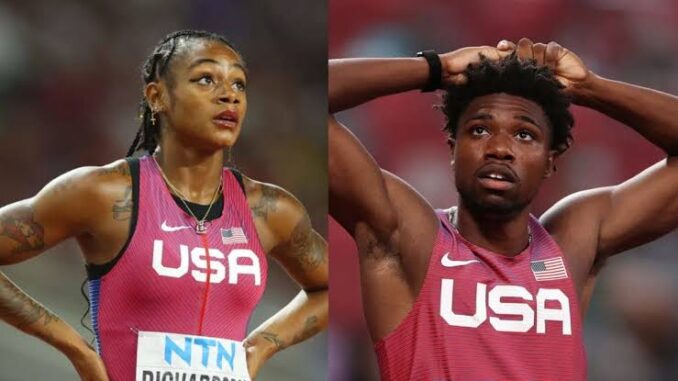
Sha’Carri Richardson’s recent suspension, reportedly due to disrespect and use of profanity toward her teammates, has added an unexpected layer of drama to her already eventful career. The track star, known as much for her charisma as her sprinting prowess, has experienced both extreme highs and devastating lows in her athletic journey. This latest controversy raises questions about the pressures facing athletes in the spotlight, and whether personal expression can sometimes overshadow professional decorum in team settings.
Richardson’s rise to fame was meteoric. Her vibrant personality, signature orange hair, and powerhouse sprints made her a fan favorite and a media sensation. However, her journey has been anything but smooth. In 2021, her dreams were dashed when she received a one-month suspension from competitive running due to a positive marijuana test, a decision that sparked international debate over the regulations surrounding recreational drug use among athletes.
Yet Richardson returned to the track with resilience, pushing past critics and obstacles to compete at the world’s highest levels. Her recent successes have continued to inspire fans who see her as a symbol of overcoming adversity. However, this suspension due to disrespect and use of profanity toward her teammates has raised a new set of concerns about her career trajectory.
While the incident remains fresh, it prompts a look at how athletes like Richardson navigate intense pressures. Training, traveling, and competing at the highest level place athletes under extreme scrutiny and require impeccable emotional management. Yet, in the heat of competitive environments, moments of tension and frustration can sometimes boil over, leading to regrettable interactions. Richardson’s suspension could highlight the need for increased support for mental health and stress management, particularly as athletes contend with fame’s demands and the expectation to maintain unwavering composure.
If Richardson’s behavior was uncharacteristic, it could indicate stress levels that necessitate intervention, especially if these types of incidents become more frequent. As a role model to many, Richardson carries the added responsibility of embodying sportsmanship. Her outburst may serve as a learning experience, prompting conversations about the importance of respect and cohesion within teams.
This incident could impact Richardson’s sponsorship deals and public image. Sponsors often seek ambassadors who not only excel athletically but also display positive, consistent values. Public outbursts can sometimes cause brands to rethink endorsements. On the other hand, the incident could spark greater transparency from athletes about the pressures they face and highlight the need for more flexible expectations, especially when dealing with individuals under intense public scrutiny.
Moving forward, Richardson’s response to this situation could be pivotal. Whether through a public apology, personal reflections, or actions showing renewed commitment to her team, her reaction might determine the long-term impact on her career and
reputation.


Be the first to comment